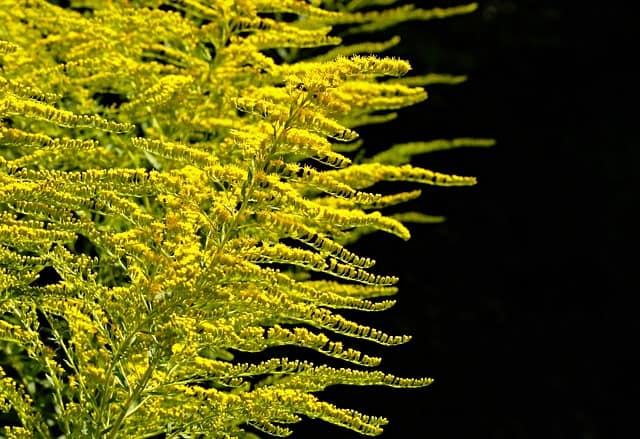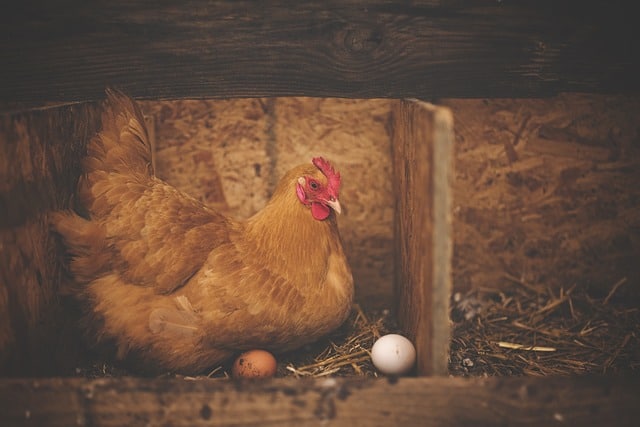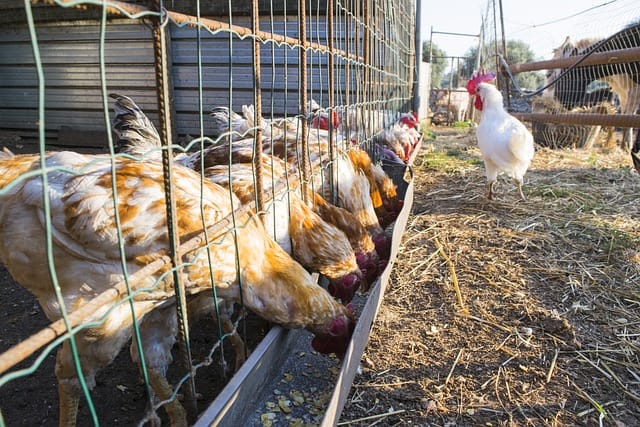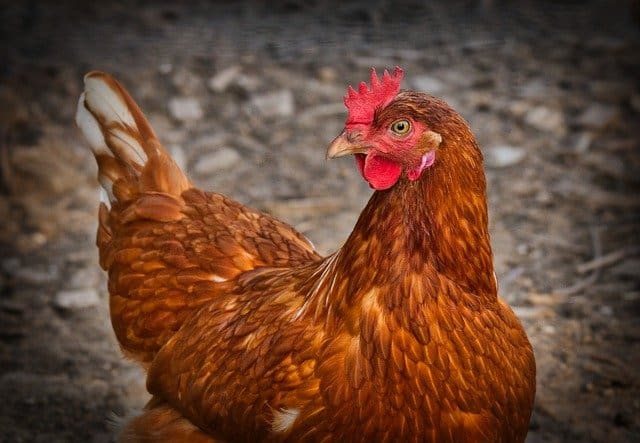Can chickens safely eat goldenrod? Well, there is no straight answer to this question, not because we do not have the answer, but because there are so many myths, theories, and misconceptions about chicken feeding.
Among these myths is that chickens must not eat certain flowers and plants because of their toxicity.
However, as astute backyard chicken enthusiasts, we assure you that our feathered friends can eat almost anything they would find in the wild, save for a few exceptions.
The information out there on the internet is not helping either. It’s conflicting, as some claim that goldenrod is poisonous to chickens while others say it’s safe and even beneficial to the birds. We will demystify these claims and provide you with an authentic response to the question.
Contents
How do we Define Goldenrod?

Goldenrod is a common name for several species of flowering plants in the Solidago genus, which belongs to the Asteraceae family. These plants are primarily native to North America, although some species are also found in Europe and Asia. Goldenrod plants are known for their bright yellow flowers that bloom in late summer and early autumn.
Goldenrod plants typically have tall, erect stems with elongated leaves and clusters of small, yellow flowers that form a dense, plume-like inflorescence. The flowers are rich in nectar and attract various pollinators, including bees, butterflies, and other insects. Due to their vibrant color and late blooming season, goldenrod flowers are often associated with autumn landscapes.
Contrary to a common misconception, goldenrod is not a major cause of hay fever allergies. Ragweed, which blooms around the same time, is the more common allergen. Goldenrod pollen is generally too large and sticky to be easily transported by wind, reducing its airborne dispersion and allergenic potential.
Goldenrod plants have also been used for various medicinal purposes by Native American tribes and early settlers. They were traditionally employed as diuretics, anti-inflammatory agents, and antiseptics. Today, goldenrod is sometimes used in herbal remedies, tinctures, and teas for its potential health benefits.
Also read: Can Chickens Eat Papaya?
Is It Safe for Chickens to Eat Goldenrod?
Yes, it is safe for chickens to eat goldenrod. However, you must feed them in moderation and should not, by any means, replace the recommended daily diet of the chicken.
According to experts, goldenrod is generally safe for chickens to eat in small quantities. Chickens are known to forage on a wide range of plants, including grasses, herbs, and flowers, and they may consume goldenrod if it is available in their environment.
However, it’s important to note that goldenrod is not a primary food source for chickens, and their diet should primarily consist of a balanced chicken feed.
Goldenrod itself is not considered toxic to chickens, and many chickens may nibble on its leaves or flowers without any issues. Nevertheless, it’s always a good idea to introduce new plants gradually to observe if there are any adverse reactions or digestive upsets. Some chickens may have individual sensitivities or preferences when it comes to foraging on different plants.
If you have concerns or if you notice any unusual behavior or health problems in your chickens after consuming goldenrod or any other plant, it’s advisable to consult a veterinarian with expertise in poultry health for guidance and assistance. They can provide specific recommendations based on your chickens’ unique needs and circumstances.
The Nutritional Value of Goldenrod to Chicken
The goldenrod flower contains various nutrients and bioactive compounds that contribute to its potential health benefits. While the exact nutrient composition can vary slightly among different species and growing conditions, here are some of the nutrients commonly found in goldenrod:
- Vitamins: Goldenrod contains vitamins such as vitamin C, vitamin A (in the form of beta-carotene), and vitamin K.
- Minerals: Goldenrod is a source of minerals like potassium, calcium, magnesium, and iron.
- Flavonoids: Goldenrod is rich in flavonoids, which are antioxidants that have been associated with various health benefits. These include quercetin, rutin, kaempferol, and apigenin.
- Tannins: Goldenrod contains tannins, which are plant compounds known for their astringent properties.
- Essential oils: Some species of goldenrod produce essential oils, which may have antimicrobial and anti-inflammatory properties.
- Phenolic compounds: Goldenrod contains phenolic compounds, which are plant compounds with antioxidant and anti-inflammatory potential.
- Fiber: Goldenrod contains dietary fiber, which is important for digestive health.
You need to know that the specific nutrient profile of goldenrod can vary based on factors such as species, location, and growing conditions.
Additionally, the concentrations of these nutrients may not be as high as in certain fruits or vegetables commonly consumed for their nutritional value. Nonetheless, goldenrod can still contribute to a varied and diverse diet, and its bioactive compounds may offer potential health benefits.
Potential Concerns with Goldenrod and Chicken
While goldenrod is generally considered safe for chickens to consume in small quantities, excess intake can lead to several health concerns.
Free-range chickens might consume a lot of the flower without your knowledge. Therefore, it is important to be aware of the following adverse events so as to take the necessary precautions:
Quantity and Digestive Upsets
Although goldenrod is not toxic to chickens, consuming large quantities of any plant material, including goldenrod, can cause digestive upsets in chickens. Introducing new plants gradually and monitoring your chickens’ responses can help prevent any adverse effects.
Choking Hazard
Goldenrod plants have stalks and stems that can be fibrous and tough, which may pose a choking hazard for chickens if they try to consume large pieces. It’s a good idea to provide goldenrod in smaller, more manageable pieces or allow chickens to forage on the plant naturally.
Pesticide Exposure
Pesticides help prevent the infestation of plantations, including those of flowers such as goldenrod. You likely use pesticides to take care of pest problems in your backyard. If your goldenrod plants have been treated with pesticides or herbicides, they can pose a risk to chickens. Always ensure that any plants or forage given to chickens are free from chemical treatments.
Allergies or Sensitivities
While rare, individual chickens may have allergies or sensitivities to certain plants, including goldenrod. If you notice any unusual reactions or symptoms after chickens consume goldenrod, it’s advisable to consult a veterinarian for guidance.
Summary
Goldenrod is not a regular chicken feed. However, it has desirable health benefits due to its rich nutrient content. You can learn more about recommended chicken feeds on our website. As with introducing any new food to chickens, it’s essential to monitor their behavior and health after consuming goldenrod or any other plant material.
If you have specific concerns about Goldenrod or if you observe any negative effects on your chickens, consulting a veterinarian with expertise in poultry health would be the best course of action.



